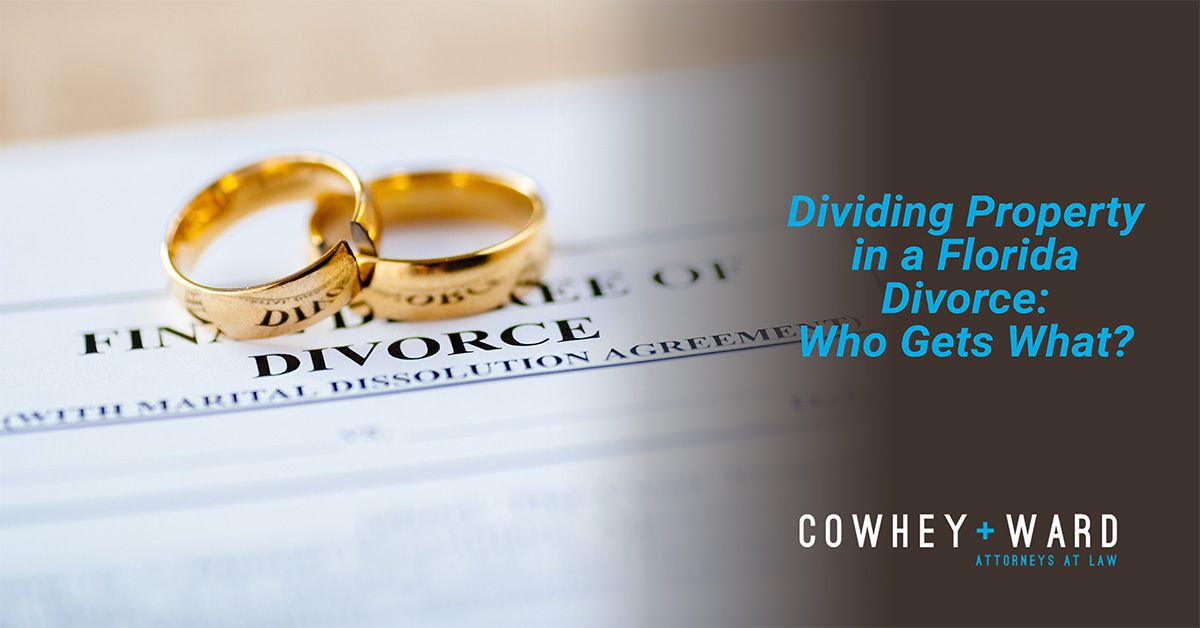Dividing Property in a Florida Divorce: Who Gets What?

If you’re facing divorce in Florida, you might be apprehensive about whether your spouse can take you to the proverbial cleaners during the process. While such apprehension isn’t misplaced, revisions to Florida’s divorce laws encourage equitable distribution of the couple’s assets. Still, when considering potential property division in divorce, you likely have questions like:
- Who gets the house?
- How do we split up the furnishings?
- Who gets the new car, and who gets the clunker?
- Can my spouse try to claim my sports memorabilia?
- Does my spouse have the right to lay any claims to the land I just inherited from my grandparents?
Adam Cowhey, a family law attorney at Tallahassee’s Cowhey + Ward, will advise you that these are reasonable questions. “While divorce law relating to property division now encourages equitable distribution in Florida, ‘equitable’ does not necessarily mean ‘equal,’” he says. “By ‘equitable,’ the law promotes property division that is fair to both spouses according to their respective circumstances.”
He adds, “In some divorces, especially with couples who have accumulated a wide variety of assets, property division can be among the most contentious components of a divorce.” To surmount property division challenges and ensure the best outcomes in its distribution, you should always consult a skilled divorce lawyer like Adam Cowhey. Let’s review what you need to know about property division under divorce law, as detailed by Florida Statute 61.075.
Marital Versus Nonmarital Property
The primary legal factor in property division during a divorce is determining whether the property is marital or nonmarital. Marital property includes assets acquired jointly or by either spouse during the marriage. Non-marital property includes assets acquired before the marriage and inheritances and gifts acquired by one spouse during the marriage. Nonmarital property that would otherwise be deemed marital can be explicitly included in a prenuptial agreement. Last, know that debts also fall under the marital versus nonmarital rubric. Thus, if one spouse has a $10,000 credit card debt, both spouses will likely be liable for it.
Given that a couple’s home is often their most valuable asset let’s take a closer look at its division. If you owned the home before you got married and retained its title, it likely has nonmarital status, though the value of any appreciation may be considered marital. Passive appreciation driven by real estate market forces typically remains nonmarital. However, divorce law deems active appreciation during the marriage, such as induced by mortgage payments and renovations, as marital. Additionally, factors like adding the spouse to the title, extensive refinancing, and significant renovations can blur the home’s nonmarital identity to the point that a divorce court might deem a large portion or all of it as marital.
What Equitable Distribution in Florida Means in Practice
The starting point for achieving an equitable distribution of marital assets (and debts) in a Florida divorce is an equal 50/50 split. However, Florida law promotes a fair outcome from the distribution by allowing divorce court judges to make distribution adjustments to address distinct factors relating to the marriage and its dissolution. Factors a judge can consider when weighing equitable distribution include:
- Respective spousal contributions to the marriage, such as financial, child-rearing, and homemaking.
- Interruptions to either spouse’s career or education due to family support needs like childcare.
- Contributions by a spouse to the other’s career or earnings potential, such as supporting a spouse through medical school.
- Respective economic circumstances of each spouse.
- Future needs of each spouse.
- Marriage duration.
- Any intentional wasting of assets.
In practice, any one of these factors could encourage a Florida family law judge to adjust the starting 50/50 distribution of assets to provide more for the compromised spouse. For example, the distribution might include reimbursement to a spouse who supported another through medical school, or the distribution might be weighted at 40/60 to provide more support to a spouse with limited income.
Negotiate a Property Settlement Agreement for the Best Outcome
Spouses undergoing divorce have the option to negotiate property division themselves, which avoids litigation costs and lets the respective spouses agree on what constitutes equitable distribution. However, a negotiated property settlement agreement agreed to by the spouses must pass muster with the judge, who can reject it if they believe it is unfair to either party.
If interested in negotiating property division during a divorce, it is best to hire an experienced divorce lawyer who can help facilitate smooth negotiations, help preserve property, and ensure the property settlement agreement adheres to the law’s equitable distribution intent.
Trust Tallahassee’s Cowhey + Ward for Your Support During Divorce
Property division during a divorce is just one of many factors that can significantly impact one’s economic situation and future. To ensure your legal rights are protected and to help navigate the complexities of Florida’s divorce laws, secure the services of a competent divorce attorney. In Tallahassee, turn to the expertise of the family law attorneys of Cowhey + Ward, who have established a solid record of securing favorable outcomes for their Leon County divorce clients. To learn more about how we deliver positive divorce outcomes through negotiations and in divorce court, contact our office today at (850) 222-1000.
Accessibility Statement
Our firm is committed to keeping our site accessible to everyone. We welcome feedback on ways to improve the site’s accessibility.
